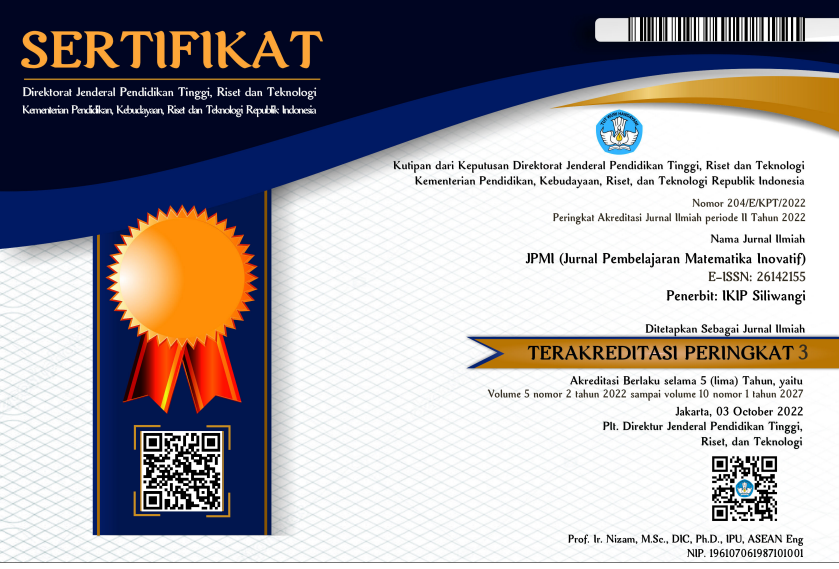PENERAPAN PENDEKATAN KONTEKSTUAL SEBAGAI UPAYA MENINGKATKAN HASIL BELAJAR MATEMATIKA SISWA SMP KELAS VII PADA MATERI ARITMETIKA SOSIAL
DOI:
https://doi.org/10.22460/jpmi.v4i5.p%25pKeywords:
Contextual, Social Arithmetic, learning motivation and student learning outcomesAbstract
The purpose of this study was to improve student learning outcomes in seventh grade junior high school students by using a contextual approach to social arithmetic material. The method used in this research is Classroom Action Research (CAR) which is divided into 3 (three) cycles. The population in this study were students of class VII-B SMP PGRI 5 Cimahi with a total of 31 students consisting of 17 male students and 14 female students. The data collection process is carried out in a planned and systematic manner to monitor the process of learning activities, increase student motivation and improve learning outcomes. Data obtained through questionnaires and cognitive ability tests. The data processing technique in this research is by calculating the percentage of the average of all students and then comparing it with the KKM score at the school. With a contextual approach to social arithmetic material, there has been a significant increase in student learning outcomes from cycle I to cycle III. Completeness of learning in cycle I was 54%, which means that in cycle I there were 17 students who had been able to reach KKM. In the second cycle the completeness increased to 77%, meaning that there were 24 students who had reached the KKM. In cycle III completeness increases to 100%, meaning that in cycle III all students can achieve the KKM score, the achievement of student learning outcomes that meet classical learning completeness based on the average score appears to have met the completeness criteria indicated by the acquisition percentage of 100%. The average score of the first cycle was 67.09, increasing in the second cycle to 74.67, and increasing in the third cycle to 87.58. The highest value in cycle I was 85, increased in cycle II to 90 and increased again in cycle III to 100. The lowest value of cycle I was 50, increased in cycle II to 60, and increased again in cycle III to 75. The meaning of individual completeness was each students have been able to achieve the KKM of 75. Achievement of student learning outcomes that meet classical learning completeness based on the average score appears to have met the completeness criteria indicated by the acquisition percentage of 100%.
References
Ajat Rukajat. (2018). Pembelajaran Contextual Teaching and Learning Untuk Meningkatkan Mutu Hasil Pembelajaran. Journal of Chemical Information and Modeling. https://doi.org/10.1017/CBO9781107415324.004
Aripin, U. (2015). Meningkatkan Kemampuan Pemahaman Matematika Siswa SMP Melalui Pendekatan Pembelajaran Berbasis Masalah. P2M STKIP Siliwangi.. P2M STKIP Siliwangi. https://doi.org/10.22460/p2m.v2i1p120-127.171
Badriyah, U. (2017). Upaya meningkatkan Hasil Belajar Matematika Siswa Pada Materi Himpunan Melalui Model Pembelajaran Kooperatif Tipe Numbered Head Together Di Kelas VII-A MTS Aziddin Medan. World Agriculture. https://doi.org/10.1038/132817a0
Supriyanto, U. (2014). Penerapan Discovery Learning Untuk Meningkatkan Hasil Belajar Siswa Kelas VI B Mata Pelajaran Matematika Pokok Bahasan Keliling Dan Luas Lingkarandi Sdn Tanggul Wetan 02kecamatan Tanggul Kabupaten Jember. Pancaran Pendidikan, 165–174.
Jamalia, J. (2018). Model CTL Untuk Meningkatkan Hasil Belajar Matematika Kelas V SDN 104/IX Kedemangan. Refleksi Edukatika : Jurnal Ilmiah Kependidikan. https://doi.org/10.24176/re.v9i1.2812
Kusmiati, E. (2019). Meningkatkan Belajar Matematika Pada Materi Aritmetika Sosial Melalui Double Loop Probem Solving Di Kelas VII SMP Negeri 1 Cilenyi Tahun Pelajaran 2017/2028. Lentera Sriwijaya : Jurnal Ilmiah Pendidikan Matematika. https://doi.org/10.36706/jls.v1i2.9885
Lasmanah, A. (2017). Peningkatan Hasil Belajar Matematika Siswa Melalui Model Kooperatif Teknik Think Pair Share (TPS) (Peneliti Tindakan Kelas Terhadap Siswa Kelas VII-A SMPN Sukasari Sumedang. Jurnal Analisa. https://doi.org/10.15575/ja.v2i3.1221
Marina, & Suciati, I. (2019). Pengaruh Pendekatan Kontekstual terhadap Prestasi Belajar Matematika Aritmetika Sosial Siswa Kelas VII SMP Negeri 3 Kota Palu. Jurnal Pendidikan Dan Pembelajaran.
Retnasari, Riska, Maulana, J. (2016). Pengaruh Pendekatan Kontekstual Terhadap Kemampuan. Jurnal Pena Ilmiah.
Suherman. (2015). Kreativitas Siswa Dalam Memecahkan Masalah Matematika Materi Pola Bilangan Dengan Pendekatan Matematika Realistik (PMR). Al-Jabar.
Ulya, I.F., Irawati, R., M. (2016). Peningkatan Kemampuan Koneksi Matematis dan Motivasi Belajar Siswa Menggunakan Pendekatan Kontekstual. Jurnal Pena Ilmiah., vol 1.
Wijayanti, A. N., & Khikmiyah, F. (2016). Pengembangan Media Pembelajaran Edutainment pada Materi Aritmatika Sosial di Kelas VII SMP. Jurnal Didaktika.
Yunita, N., Rosyana, T., & Hendriana, H. (2018). Analisis Kemampuan Berpikir Kritis Matematis Berdasarkan Motivasi Belajar Matematis Siswa SMP. JPMI (Jurnal Pembelajaran Matematika Inovatif). https://doi.org/10.22460/jpmi.v1i3.p325-332

















